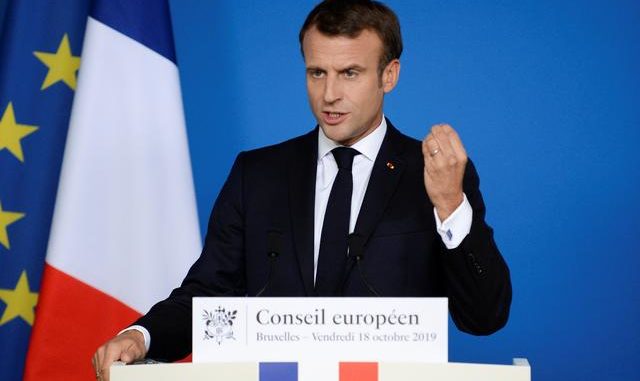
France’s president on Friday decried NATO’s inability to react to what he called Turkey’s “crazy” offensive into northern Syria and said it was time Europe stopped acting like a junior ally when it came to the Middle East.French President Emmanuel Macron gestures as he holds a news conference at the end of the European Union leaders summit dominated by Brexit, in Brussels, Belgium October 18, 2019. REUTERS/Johanna Geron
Turkey’s military incursion into Syria to attack Kurdish forces, launched after U.S. President Donald Trump pulled American troops out of the way, caught NATO’s strongest European powers – France, Germany and Britain – by surprise.
It left them incensed, fearing the fighting would cause a security vacuum in which Islamist militants would escape Kurdish prisons and pose new danger, undoing a Western-led coalition’s success in dismantling Islamic State’s territorial “caliphate”.
The Turkish assault also left European Union powers scrambling to form a coherent response beyond refusing to pay Turkey to contain any new refugee crisis on Europe’s doorstep.
Turkey agreed to a truce on Thursday after talks with U.S. officials, setting a five-day pause for Kurdish-led SPF militia to withdraw from an area where Turkish forces now prevail. But Washington said the deal covered only a small part of the territory Turkey aims to seize as a “safe zone”, and shelling could be heard again along the border on Friday.
“I consider what’s happened in the last few days (in northern Syria) to be a serious mistake by the West and NATO in the region,” French President Emmanuel Macron told reporters after a European Council summit in Brussels.
“It weakens our credibility in finding partners on the ground who will be by our side and who think they will be protected in the long term. So that raises questions about how NATO functions.”
Macron and French government officials have in the last week warned that the 28-nation European Union risks falling into irrelevance on foreign policy unless it finds a stronger and more coherent way to respond to what they see as unpredictable allies such as U.S. President Donald Trump’s administration.
ERDOGAN MEETING
Discovering through Twitter that the United States was pulling its troops out of northern Syria, which forced France to also withdraw its special forces, made it seem as if Europe was an inconsequential junior ally in the Middle East, Macron said.
“I thought we were in NATO. I thought that the United States and Turkey were in NATO, and then I discovered by tweet that the U.S. had decided to withdraw its troops and pave the way (for Turkey’s offensive) in the area,” he said. “Like everyone else, I realized that another NATO power had decided to attack partners of the coalition fighting Islamic State.”
Macron said it was time for himself, British Prime Minister Boris Johnson and German Chancellor Angela Merkel to act and said they would meet Turkish President Tayyip Erdogan in the coming weeks, most likely in London.
“It’s important to meet and coordinate between the three Europeans and Turkey,” Macron said. “We need to see where Turkey is going and how to bring it back to a reasonable position.”
How much the Europeans can actually do to change the dynamics in northern Syria remains to be seen given the balance of power in the region has shifted away from the West.
“The reality I see today is that in the region those who have come out as the winners by imposing their strength are Turkey, Russia and Iran. I’m not sure that was the best strategic thing to happen for Europe and the United States,” Macron said.
“It’s crazy to do what the Turks are in the process of doing.”
Writing by John Irish; Editing by Mark Heinrich
BRUSSELS (Reuters) –
